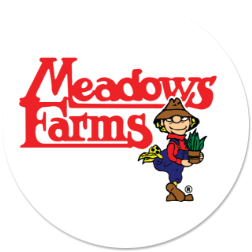Growing and maintaining an organic vegetable garden is a great way to reduce your grocery bill while connecting with nature. Follow these suggestions to be a successful organic gardener:
Have a Plan
Select a site in your yard that gets at least six hours of direct sun. Prepare
the soil by tilling in good composted matter. A well prepared site and soil will greatly increase your yields.
Select Disease Resistant Varieties
Meadows Farms partners with growers that choose varieties suited to grow in our region. It is good to rotate crops from year to year to help reduce disease. For example try not to plant tomatoes in the same portion of your garden each year. Remove any diseased foliage from the plants and discard in a trash can. Do not compost diseased plants in your compost pile. Space plants to help air flow. Good circulation reduces fungal disease.
Feed Your Plants
Use organic plant fertilizers such as composted manure to fertilize the garden. If manure is not your thing organic plant foods are also available. Organic fertilizers usually contain trace elements beneficial to the plants. A happy healthy plant produces better results at the table.
Mulch and Weed
Mulching the garden helps to control moisture and weeds. Straw is a good mulch for organic gardening. As it decomposes it will add to the organics of the soil. When weeds pop up, pull them from the garden. Weeds compete for light, water and nutrients in the soil.
Water
Watering the soil and not the foliage helps to reduce fungal disease. Plants should not have wet leaves going into the night. Use a soaker hose to get water into the root zone.
Plants Some Flowers
Planting flowers like marigolds and geraniums will make your garden brighter. They have strong scents and can help keep animals like cats, dogs and rabbits out of your garden plot.
Enjoy!

